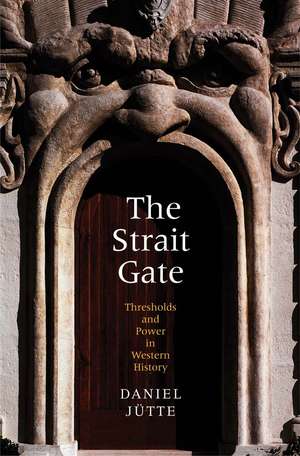The Strait Gate: Thresholds and Power in Western History
Autor Daniel Jutteen Limba Engleză Hardback – 22 sep 2015
A prize-winning scholar offers a sweeping exploration of the role doors have played in history
Exploring a chapter not yet probed in the cultural history of the West, The Strait Gate demonstrates how doors, gates, and related technologies such as the key and the lock have shaped the way we perceive and navigate the domestic and urban spaces that surround us in our everyday lives. Jütte reveals how doors have served as sites of power, exclusion, and inclusion—and, by extension, as metaphors for salvation—in the course of Western history.
This book makes it clear that doors, more than any other parts of the house, are the objects onto which we project our ideas of and anxieties about security, privacy, and shelter. Without doors, of course, houses could not exist. But even though we each walk through doorways well over a hundred times a day, we typically pay little attention to the doors we encounter. We regard them simply as a means of entering or leaving a building or room. Yet when our doors stop working as they should—when we find that we cannot lock or open them, for instance—we react with discomfort and anxiety.
Drawing on a wide range of archival, literary, and visual sources, as well as on research literature across various disciplines and languages, Jütte pays particular attention to the history of the practices that have developed over the centuries in order to handle and control doors in everyday life.
Exploring a chapter not yet probed in the cultural history of the West, The Strait Gate demonstrates how doors, gates, and related technologies such as the key and the lock have shaped the way we perceive and navigate the domestic and urban spaces that surround us in our everyday lives. Jütte reveals how doors have served as sites of power, exclusion, and inclusion—and, by extension, as metaphors for salvation—in the course of Western history.
This book makes it clear that doors, more than any other parts of the house, are the objects onto which we project our ideas of and anxieties about security, privacy, and shelter. Without doors, of course, houses could not exist. But even though we each walk through doorways well over a hundred times a day, we typically pay little attention to the doors we encounter. We regard them simply as a means of entering or leaving a building or room. Yet when our doors stop working as they should—when we find that we cannot lock or open them, for instance—we react with discomfort and anxiety.
Drawing on a wide range of archival, literary, and visual sources, as well as on research literature across various disciplines and languages, Jütte pays particular attention to the history of the practices that have developed over the centuries in order to handle and control doors in everyday life.
Preț: 500.69 lei
Preț vechi: 650.24 lei
-23% Nou
Puncte Express: 751
Preț estimativ în valută:
95.81€ • 102.45$ • 79.88£
95.81€ • 102.45$ • 79.88£
Carte tipărită la comandă
Livrare economică 18 aprilie-02 mai
Preluare comenzi: 021 569.72.76
Specificații
ISBN-13: 9780300211085
ISBN-10: 0300211082
Pagini: 384
Ilustrații: 37 b-w illus.
Dimensiuni: 140 x 210 x 25 mm
Greutate: 0.77 kg
Editura: Yale University Press
Colecția Yale University Press
ISBN-10: 0300211082
Pagini: 384
Ilustrații: 37 b-w illus.
Dimensiuni: 140 x 210 x 25 mm
Greutate: 0.77 kg
Editura: Yale University Press
Colecția Yale University Press
Notă biografică
Daniel Jütte is a historian of early modern and modern European history. He is a Junior Fellow in the Harvard Society of Fellows and a fellow of the Wissenschaftskolleg Berlin. He lives in Cambridge, MA.
Recenzii
“An engrossing and powerfully illuminating history of our most intimate surroundings.”—Joseph Koerner, Harvard University
“A wide-open book, erudite, deep, nimble, graceful and fun.”—Thomas V. Cohen, York University
“This is a splendid work of cultural history. By examining the vast array of overt and hidden meanings that came to be attached to doors in early modern Europe, the author provides an enticing gateway to a rarely considered aspect of pre-modern life.”—Christopher R. Friedrichs, University of British Columbia
